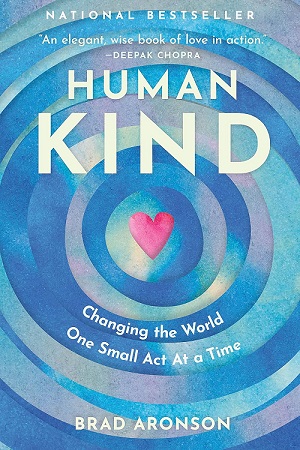HumanKind: Changing the World One Small Act at a Time by Brad Aronson is an inspiring book that highlights the profound impact small acts of kindness can have on individuals and communities. Through real-life stories of compassion, Aronson illustrates how each of us can make a positive difference in the world by simply being kind, generous, and thoughtful in our everyday lives. The book encourages readers to recognize their potential to create change and to see how even the smallest actions can lead to a ripple effect of goodness. below are the lessons from the book:

Read: The Book of Joy
1. The Power of Small Acts of Kindness
The central message of HumanKind is that small acts of kindness can have a tremendous impact. Aronson recounts numerous stories where simple gestures—such as a kind word, a helping hand, or even just being present—transformed the lives of individuals in need. These small actions, when done consistently, can create lasting positive change.
- Key takeaway: You don’t need to be a hero or do something grand to make a difference. A kind smile, a thoughtful gesture, or offering help to someone in need can have a ripple effect and inspire others to spread kindness. Example: The author shares a story about a woman who lost her husband and felt alone. Her neighbor, seeing her sadness, began inviting her over for tea. That simple act of kindness created a lasting bond and significantly helped the woman during her time of grief.
2. Kindness During Difficult Times
A major theme of the book is how kindness can bring hope during challenging moments. Brad Aronson was inspired to write the book after his wife was diagnosed with leukemia. During this difficult time, they received overwhelming support from friends, family, and even strangers. This outpouring of kindness helped them cope with the challenges they were facing.
- Key takeaway: When someone is going through a tough time, even a small gesture of kindness can be a source of strength and comfort. Offering to run errands, providing a listening ear, or simply being there can make all the difference. Example: Aronson shares how friends and strangers sent meals, offered rides, and provided emotional support during his wife’s illness. These acts of kindness helped his family during one of the darkest times in their lives.
3. The Ripple Effect of Good Deeds
Aronson emphasizes the ripple effect of kindness—how one good deed can inspire others to continue the chain of generosity. Often, when someone receives kindness, they are motivated to pass it on, creating a cycle of positivity and goodwill.
- Key takeaway: One act of kindness can multiply and lead to a broader impact. By being kind, you not only help one person but also potentially inspire them to help others, creating a wave of positive change in the community. Example: In the book, Aronson tells the story of a young boy who started a charity to help children in hospitals after being the recipient of kindness during his own hospital stay. His one small act of gratitude led to a large-scale movement that continues to help thousands of children.
4. Everyone Has the Power to Make a Difference
A core message of the book is that everyone can make a difference, regardless of their resources or circumstances. Aronson showcases stories of everyday people—teachers, students, neighbors—who used their unique talents and resources to help others. The book emphasizes that you don’t need to be wealthy or influential to create change; you just need to be willing to take action.
- Key takeaway: Each of us has the power to change the world through our actions. Whether it’s volunteering, helping a friend, or simply spreading positivity, everyone can contribute to making the world a better place. Example: One story features a teacher who started a mentorship program for underprivileged children. By dedicating just a few hours each week, she changed the trajectory of her students’ lives, proving that anyone can have a profound impact with a bit of time and effort.
5. Kindness Is Contagious
Brad Aronson illustrates how kindness is contagious—one small act can inspire others to join in. This concept plays out in many of the stories throughout the book, where one person’s kindness leads to others stepping up and contributing to a larger cause.
- Key takeaway: When you lead with kindness, you encourage others to follow. Your actions set an example for others, showing them the power of doing good. This can lead to a collective movement toward a more compassionate society. Example: Aronson tells a story about a group of people who rallied to support a young boy battling cancer. One small act of kindness—offering to take the boy to a baseball game—snowballed into a community-wide effort to support his family, with hundreds of people getting involved.
6. The Importance of Community
One of the important lessons from HumanKind is the value of community and connection. Aronson emphasizes that people thrive when they feel supported by those around them. By fostering connections with neighbors, friends, and even strangers, we can create strong communities where everyone looks out for one another.
- Key takeaway: Building a sense of community is essential for creating a supportive environment. When we connect with others and offer help, we create a network of kindness that lifts everyone up. Example: A powerful story in the book involves a group of neighbors who came together to rebuild a family’s home after it was destroyed by a fire. Their collective effort showcased the power of a close-knit community in times of crisis.
7. Gratitude and Kindness Go Hand in Hand
Another lesson in the book is the connection between gratitude and kindness. Aronson explains that when people feel grateful, they are more likely to perform acts of kindness. Additionally, practicing kindness can help cultivate gratitude by shifting your focus away from what’s lacking and toward what’s abundant.
- Key takeaway: Cultivating a mindset of gratitude not only makes you more appreciative of life’s blessings but also motivates you to spread kindness to others. By focusing on what you have, you become more willing to give. Example: The book tells a story of a woman who, after receiving help from a stranger during a tough time, began volunteering at a local food bank. Her newfound sense of gratitude inspired her to pay it forward.
8. The Role of Compassion in Leadership
In HumanKind, Aronson touches on how kindness and compassion are essential qualities in leadership. Leaders who lead with empathy and compassion inspire trust, loyalty, and commitment from their teams. Whether in the workplace or in personal relationships, leading with kindness creates a positive environment that encourages others to do the same.
- Key takeaway: Kindness is not only a personal virtue but also a leadership quality. When leaders prioritize compassion and generosity, they build stronger, more cohesive teams that are motivated to succeed together. Example: Aronson shares a story about a business leader who, instead of cutting employees during a financial downturn, decided to personally sacrifice his own salary. This act of kindness inspired immense loyalty and dedication from his team, and they were able to overcome the crisis together.
9. The Joy of Giving
Aronson highlights that one of the most fulfilling aspects of kindness is the joy that comes from giving. When you perform an act of kindness, it not only benefits the recipient but also brings happiness and fulfillment to the giver. Giving, even in small ways, enriches your life and brings a sense of purpose.
- Key takeaway: The act of giving is a powerful way to find joy and meaning in your life. When you focus on helping others, you feel more connected, content, and fulfilled. Example: The author shares a story of a retired couple who started hosting holiday dinners for lonely individuals. What began as a small gesture of kindness turned into a tradition that brought happiness not only to their guests but also to themselves.
Conclusion
In HumanKind: Changing the World One Small Act at a Time, Brad Aronson reminds us that kindness is a powerful tool for creating positive change in the world. Through small, thoughtful actions, we can make a meaningful impact on the lives of others and contribute to a more compassionate society. The book is a call to action for everyone to recognize the opportunities for kindness in their daily lives and to take those opportunities to create a ripple effect of goodness (Amazon).



